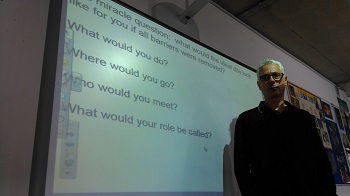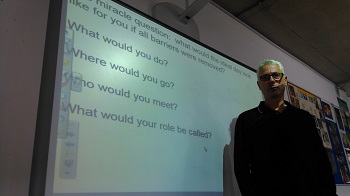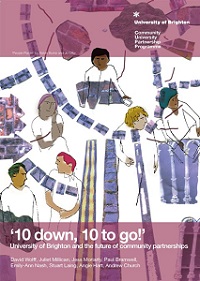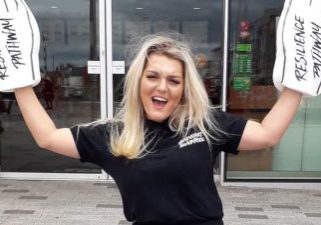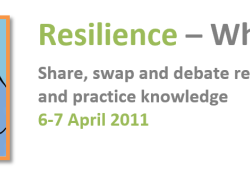Boingboing blogs from… the Resilience Forum!
Creating a future vision for your work – David Wolff, Community University Partnership Programme, Brighton Resilience Forum – Thursday 21 April 2016
by Becky, Boingboing volunteer and blogger
“Right, it’s time to build a human pyramid…” starts Dave. “Wha…?” Oh, he’s joking, good job as it’s a long time since I did PE. As always the group introductions highlighted a lot of connections and common interests in the room, and if it was possible, an even more diverse crowd than usual. After an initial section on the history of Community University Partnership Programme (CUPP), and the astonishing number of partnerships they have actually initiated, nurtured and supported, Dave explained the creative task ahead of us in forming a future vision. It’s based on the Miracle Question (from Solution Focused Therapy), and is something that anybody can do. The Question is this:
“What would the ideal day look like for you if all barriers were removed?”
It’s then broken down into: What would you do? Where would you go? Who would you meet? What would your role be called?
Photo: It’s not always easy to tell when Dave is joking.
After you have described your ideal day, you look at where you are now, and the gap between the two, which then becomes your strategy for getting from one to the other. People vary in how easy they find it, but Dave assures us that if he can do it anybody can (I may be paraphrasing a little there).
Right, so Angie and I decided to focus our future vision on the Resilience Forum. We do have other things in our lives, but the Resilience Forum is sort of our baby, and we want to make sure that we help it develop its own future aspirations! This is what we came up with:
Angie: “We meet the speakers in passing, a visiting Prof over from South Africa who works with us on a project applying our Academic Resilience Approach in South African schools, presenting together with a teacher from a school in South Africa. Mary Hinton from Boingboing is chairing the Forum today and we enjoy a gorgeous lunch with the speakers in our canteen. All admin and IT support and parking are sorted. After lunch we go to the Forum space, a lovely room (on this campus) with a massive screen so people can beam in from other places.
People are already there, making tea and coffee and helping themselves to drinks from the fridge, before finding themselves a comfy seat. About forty of us sit down and listen to the speakers tell us about what they’ve been up to. We’ve got the usual mixed bunch of people. Josie’s met with a few people before too to plan some future Forums. She’s finished her PhD now and is doing postdoctoral research on the project the South Africans are working with us on. People hang around afterwards. Two new PhD students get some help from a couple of old lags.
A member of a local charity, who is really struggling with her mental health, goes off to the station to get her train with another newbie. They were chatting about the amazing work the South Africans are doing in schools – these new approaches are really helping them to develop their resilience. The speakers are having to be dragged off to dinner. They’re happy talking to an academic from a London Uni and a Deputy Head of a school who want to get stuck in together with a similar project in their area. The kids come out of the crèche and it’s lovely to see them. Their parents have enjoyed the Forum and learnt a few techniques to take home.”
Becky: “We arrive at our dedicated, exclusive and purpose-built accessible Resilience Forum venue. Water, tea, coffee, fruit, biscuits etc, and other practicalities, have been taken care of by university hospitality in recognition of the value of the Forum space for Community-University Partnership working. We have administrative support from our School (university department), and Student Ambassadors greet people as they arrive, signing them in with a smile, a name label and a bunch of neatly stapled handouts. They also look after the speaker, making sure that they find the venue and have had something to eat before the session.
Our venue is well served by free, regular and reliable public transport. But in recognition of the range of needs of our Members, there is ample designated parking right outside. Everybody who attends the Forum has booked, and everybody who has booked for the Forum attends. The speaker is fascinating, engaging, motivating, inclusive, and supplies slides, photos and other free resources for people to access on the Boingboing website. There’s note paper and pens available for people who want them. Forum members live tweet the event (with photos!) using a short, easy to remember and not-already-in-use #hashtag. Members from a community digital media project volunteer to film and live stream the session, using their state of the art unobtrusive, wireless, interference-free equipment, plus they edit and upload a copy to YouTube for later. Another technical multi-tasker handles the questions that come in from our online participants via Twitter and Skype.
At the end of the Forum our Student Ambassadors collect everybody’s completed feedback forms. Now that the Resilience Forum has been funded indefinitely by anonymous philanthropists (who never request annual reports and accounts), the data collected by the students form part of their own co-productive community-based research projects that contribute towards their degrees. Everybody finds the session useful and meets at least one person with whom they can make a valuable personal or professional connection. My daughter has been in Angie’s free crèche and hasn’t flicked yoghurt at anybody for the whole hour and a quarter. It’s a new record.”
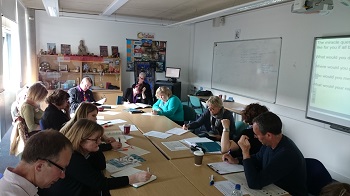
On reflection you can really see that many of wishes for our ideal Resilience Forum include elements of the Resilience Framework, both for the Forum and for its Members: the basics – accommodation, access and transport, (relatively healthy) food and drink, enough money to be sustainable; and belonging – meeting in our own space, making new connections and having responsibilities. And as luck would have it, part of Angie’s dream sort of came true (see Resilience Forum on Monday 13 June when we have a Prof visiting from South Africa! – it’s almost as if Angie knew that when she wrote her future vision…).
Angie and I found it much easier to tackle a small, discrete area of our lives in this relatively short amount of time. Dave didn’t recommend going too wide or too abstract, but you could apply it to your whole day, and you could bring together the days of your group or team if you want to think a bit bigger. He also suggested thinking about small steps, imagining that if your ideal day is a 10, and you are at a 3 now, how do you get to a 4, rather than how do you get straight to 10.
The group conversation afterwards was really interesting and most people found the exercise rewarding. Comments included that it kept the focus on the positive and could be affirming if some things are already going well, allowing people to recognise what has already been done; someone said that it was a quick exercise which produced a concrete output that was specific, strategic and reflective, but still in context; someone else found it energising to think about their own values; there was recognition of what is possible/within our control and what is outside our control; and one person felt they had been able to be bolder, think outside the box and say things that they might not otherwise say. A particularly insightful comment was about recognising that there are usually still slots in your average day when you are achieving your ideal, and living to your values, doing what you want to do, even if your whole day isn’t ideal.
In terms of application someone thought that the technique could be empowering in working with others (perhaps in a school, social work or family context), as it is recognising what that person actually wants, getting an insight into how they think about themselves, where and how they want their life to go, without making judgments and just starting with where they are at right now.
Well done Dave, we like a happy ending. Plus, whilst we were sharing how we found the exercise, I got some really useful feedback on my conundrum of how to get people to live tweet from the Resilience Forum: “Becky, have you tried actually asking people?” …
